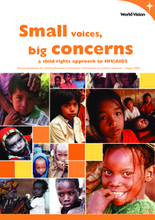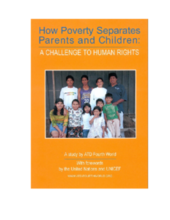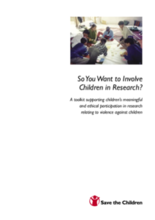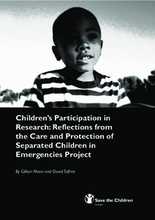Displaying 311 - 320 of 345
Outlines how a child rights approach can be used to strengthen policy implementation and provides recommendations as to how the EU institutions can move forward in implementing commitments to OVC.
This report examines the current state of orphans and vulnerable children. It provides a regional overview, highlights trends, urges support for alternatives to institutional care and child participation, and presents a framework of protection and care of orphans and vulnerable children. Includes comprehensive data appendices.
An informal evaluation of an NGO residential institution in Zimbabwe, based on the opinions of the child residents. Includes recommendations for the improvement of residential care.
An executive summary of lessons learned on preventing family separation in poverty stricken communities. Brief case studies from Guatemala, Haiti, Philippines, United States and Burkina Faso.
A faith-based approach to promoting and integrating child participation into communities. Includes guidelines for the design, implementation and evaluation of programs, as well as specific activity recommendations and case studies.
A toolkit offering operational guidance and techniques for eliciting child participation in primary and secondary research. Includes in-depth consideration of related ethical issues.
A sample survey designed to be used in interviewing parents and guardians of children ages six to twelve years old. The questions assess household financial security, socio-demographic and community characteristics, psychosocial intervention exposure, income generation intervention exposure, health status, HIV/AIDS prevention exposure, legal rights, and coping skills. Includes sample consent form.
Paper described ways in which children separated in emergencies have been involved in research about their community and lives. It focuses on identifying the most appropriate and achievable way to involve children given the reality of their context and circumstances, and includes an appendix of specific games to encourage child participation.
Outlines the psychosocial impacts of HIV/AIDS on children and suggests principles and activities to strengthen psychosocial support. Includes a brief list of follow-up resources.
Outlines the Butterfly Program in India, which utilizes to an empowerment approach to working with children living and working on the streets of New Delhi. Highlights the importance of child participation and rights.







